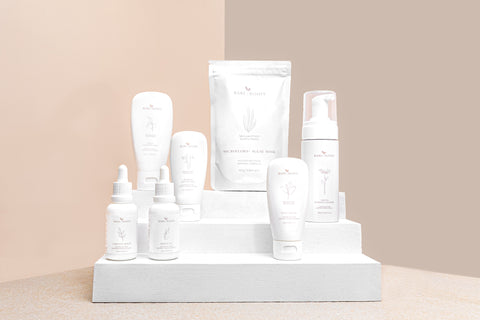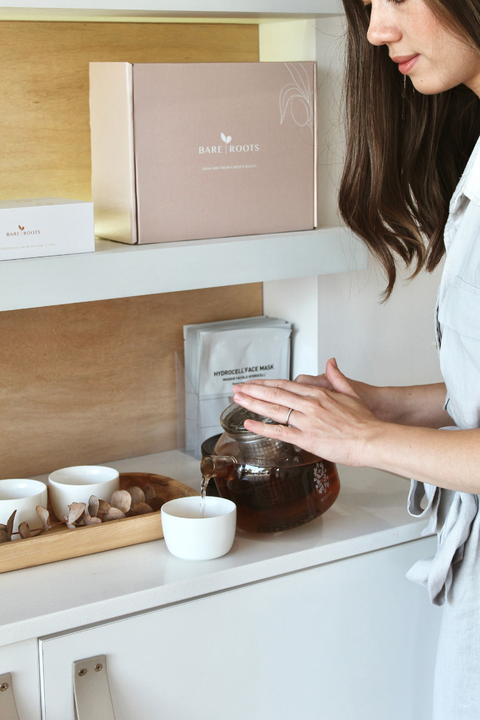It’s exciting to see the switch to more natural, conscious living and consumption still on the increase. What has been touted as just a trend in the past is now a full-blown movement, and it doesn’t look to be losing speed. We’re all about it! But, as with any movement with strong momentum, there can be murkiness, grey areas and sadly, deception. We wanted to share some insights on what to look for when you’re buying organic skincare so you can confidently support your switch to a more holistic lifestyle.
I’ve said it before, but it’s worth repeating now….We as people can be very trusting when it comes to marketing claims. Because, honestly, did we really expect there to be ingredients in our everyday products that were not conducive to healthy skin? NO, of course not! But sadly this is just not the case and in reality every product is made with different intentions - some good and some not so.
Consumers are getting more savvy when it comes to greenwashing!
The good thing is though, consumers are becoming more aware of some of the misleading marketing tactics that companies have gotten away with in the past. Now, we as consumers are looking for brands that are transparent, honest and really have integrity behind their actions and the products they release into the market.
Greenwashing is a form of marketing spin in which green PR and green marketing are deceptively used to persuade the public that an organisation's products, aims and policies are environmentally friendly. When in actual fact what’s really going on behind the scenes isn’t so green. Great examples of companies being called out for greenwashing include H&M, Ikea and Volkswagen. And this kind of deceptive behaviour happens across all industries and business sizes as consumers seek out more ethically-forward brands to support.
It can happen in skincare quite easily as well unfortunately. Especially as the consumer demand for more ‘natural’ skincare continues to increase, companies want to be seen as meeting this desirable focus point. But this may lead consumers to believe they’re using something healthier than they truly are. There’s also some quite lax regulation around displaying ingredients in products which means nasties can be slipped in without our knowledge.
What’s the difference between natural and organic skincare?
Many people often put natural and organic terms in the same basket; however, they couldn't be more different.
When a product makes natural claims here are the standards that could potentially follow:
- Unregulated (no laws around what can and can't be done)
- Green washing very common
- Open to misleading claims on labels (due to it being unregulated)
- No minimum requirement for ‘natural’. This means that as little as 1% of the product can be 'natural' and companies can market their product as 'natural'
- Does not have to consider environmental impact (not eco conscious)
The point of difference with Certified Organic Claims means:
- Cosmetics are heavily regulated
- No greenwashing allowed
- No false or misleading claims
- Must contain a minimum % of organic & natural
- Considers environmental impact
Here’s why you should be choosing certified organic skincare over ‘natural’
As we’ve just highlighted there’s a big difference between organic and natural beauty products. Natural may contain a small hint of a natural ingredient and the brand would then be able to call their product ‘natural’. In our eyes though, if 99% is synthetic and 1% natural - then that’s not by definition a ‘natural’ product. In fact, even the presence of just 1 synthetic ingredient is by definition not a true ‘natural’ product..
Many ‘natural’ ingredients may have received exposure to chemical interaction, impacting its purity and potency to some degree. These chemical interactions can include pesticides, radiation and additives during the growth phase, and can adulterate the quality/potency of the botanical ingredient.
Organic products on the other hand are regulated and do need to meet minimum standards of truly natural and organic ingredients to claim the ‘organic’ title. This makes it extremely difficult for brands to be misleading, and allows you to feel much more confident in the products you’re choosing.
Our bodies absorb the products we apply to our skin, whether it’s deodorants, make-up, skincare or other personal care items. This means it’s important to be just as selective on what beauty and skincare products we buy, and what’s in them, as we are with food. But when you buy organic food, you look for the organic certification label and you can be confident it’s properly regulated. With skincare and the confusion surrounding natural vs organic, it isn’t always so transparent if you’re choosing the best option.
The COSMOS Standard & seeking proof
As the demand for healthier skin care continued to rise, and greenwashing along with it, there came the need for a certifying body to help consumers distinguish between natural beauty products and truly organic skincare. Enter the COSMOS Standard.
For skincare to qualify for organic certification it must meet a list of very strict criteria before it gets approved. COSMOS (Cosmetic Organic National Standard) is a certifying body that aims to harmonise organic standards in cosmetics on a global scale. ACO (Australian Certified Organic) follows COSMOS certifying guidelines for their products.
As we seek to remain transparent and deliver truly nourishing products, Bare Roots are COSMOS certified. Organic certifications by companies such as COSMOS are important to look for when any brand claims organic status. If there’s no certification, but they do claim ‘natural’ status, then understand that there can be potential for less than desirable ingredients included for your skin.
How to Identify Organic Skincare
Finding quality skincare that is good for your skin and the environment shouldn’t be so difficult, but unfortunately it can be. If you want to find and buy organic skincare in Australia online, here’s a gentle reminder on what to look for:
Certifications
Any brand or product that claims to be organic should have certifications to back it up. You can trust that when you use Bare Roots skincare you are getting the COSMOS seal of approval, and using quality products made from nature's best ingredients. Look for certifications across your products when seeking the most natural options.
Transparent Natural Ingredients
You want to read the ingredients list of any skincare product claiming to be natural or organic and check for any of the undesirable ingredients commonly included in cosmetics.
Research
Always do your own research into brands and products, as this can be a great way to determine if there’s potential greenwashing afoot. What are people saying about them? Have they got good reviews? What ingredients are they using, and when you search those ingredients, are they coming up with any concerning information? Are their certifications legitimate? No matter what a company claims, we always recommend looking into things for yourself to ensure you are getting the safest and best possible products.
Organic & Natural Skincare with Bare Roots
It has been our mission at Bare Roots to create a brand of transparency. Our founder Suzanne, is a qualified Dermal Therapist who runs a holistic skin care clinic in Australia with over 10 years in the skin industry. Suzanne is driven to debunk common skincare myths and provide education around organic cosmetic chemistry.
Suzanne started Bare Roots because of the lack of transparency, education and presence of certified organic skincare products available online. Bare Roots products are not only COSMOS organic certified, they are cruelty free, pregnancy safe, environmentally conscious, and packed full with essential vitamins, antioxidants & potent anti-inflammatory ingredients.
You can confidently buy organic skincare in Australia online with Bare Roots.






